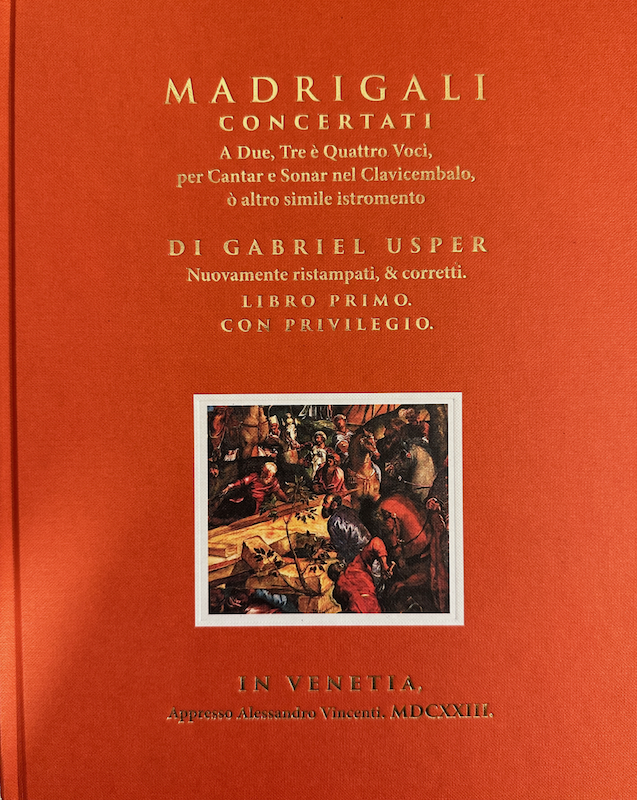
Published: 11.10.2023.
In the fall of 2023, the Matica Hrvatska branch in Sveta Nedelja, in co-publishing with the Croatian Music Center, issued the first contemporary critical printed edition of the collection of the Croatian and European baroque composer Gabriel Usper, entitled “Madrigali concertati”, which saw the first light of a day back in 1623 in Venice by the printer Alessandro Vincenti. The special value of this collection lies in the fact that it is probably the only complete work of this gifted composer born at the end of the 16th century in Poreč or Rovinj, and the only completely preserved original in 5 volumes (Canto, Alto, Tenore, Basso and Basso continuo) is located in the “Staats- und Universitätsbibliothek Carl von Ossietzky” in Hamburg. The first contemporary critical printed edition of the collection “Madrigali concertati” by Gabriel Usper was prepared by Prof. Ph. D. Ennio Stipčević and musicologist Ivana Petravić, while the editors are Assist. Prof. Ph. D. Martina Mičija Palić and Robert Palić. The reviewers of the edition are distinguished scientists and artists, Assist. Prof. Ph. D. Monika Jurić Janjik from the Academy of Music in Zagreb, Ph.D. Marko Motnik from the Institute of Musicology ZRC SAZU (Slovenian Academy of Sciences and Arts) and one of Croatia’s best harpsichordists and organists Prof. art. Mario Penzar. The edition contains 13 madrigals, and the transcription was made according to the postulates of the “historically informed performance”, to bring this valuable early baroque musical heritage into a life, which is another indicator of our culture’s belonging to the West European civilizational and cultural circle, both 400 years ago when this collection was created, and today. The book contains the Editor’s Word, Preface, Critical Notes, and three appendices, which provide information about the composer, the context of the creation of this collection, the text of the original cover and the dedication, information about the madrigal text sources and poetic templates, and the critical apparatus in three languages: in Croatian, English, and Italian. The co-workers who proofread, translated, and prepared the introductory text contributions were Antonija Fabeković (proofreading of the Croatian language), Prof. Ph. D. Mateusz-Milan Stanojević (translation and proofreading of the English language), Maura Filippi (translation of the Italian language), Dr. Gian Luca Borghese and Elia Skazlić (proofreading of the Italian language). The graphic design of the cover was created by Robert Palić, and layout and printing were accomplished by Sveučilišna tiskara d.o.o. Special gratitude for the creation of this edition goes to Prof. Ph.D. Ennio Stipčević, an associate member of HAZU (Croatian Academy of Science and Arts), musicologist, and leading expert on the period of Renaissance and Baroque in Croatian music, for whom this collection, as one of the many discoveries in his long and fruitful career of scientist and researcher, represents a significant monument of Croatian and European early Baroque music. The publication of the “Madrigali Concertati” in contemporary printed form was made possible by the City of Sveta Nedelja, Zagreb County, and the City of Zagreb, for which we are sublimely grateful.
From the review of Assist. Prof. Ph.D. Monika Jurić Janjik:
“The critical edition of Gabriel Usper’s collection of Madrigali concertati undeniably represents another valuable contribution to the effort to revive the early music of authors of Croatian origin. In addition to serving as a basis for new scientific research, it will breathe new life into these madrigals after four centuries of oblivion, and offer a wider audience the opportunity to get to know one of the lesser-known musicians of Croatian origin and their almost unknown works that should be given at least approximately equal attention as is the case with other, more famous musical works from the rich treasury of the history of Croatian music. It should also be emphasized once again that Gabriel Usper worked in the Venetian environment, where he actively contributed to the musical life of that time with his musical knowledge, talent, and hard work, therefore the collection of Madrigali concertati is also significant as part of the wider Western European early baroque musical heritage. Those who are responsible for the realization of this critical sheet music edition – the organizers and editors – should be given great recognition for all the hours, days, and years they invested to include early Croatian music in contemporary concert life. Without them, this – as Ennio Stipčević described this collection in the Preface of this edition – ‘the pearl of Venetian, madrigal, mannerist music’ would still remain hidden.”
The main motto of the programme on which the idea of the HGC is based is: “Let’s listen to Croatian music!”